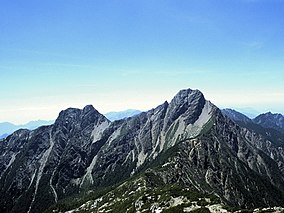This is an old revision of this page, as edited by 148.87.1.170 (talk) at 22:51, 24 August 2009 (→Pictures). The present address (URL) is a permanent link to this revision, which may differ significantly from the current revision.
Revision as of 22:51, 24 August 2009 by 148.87.1.170 (talk) (→Pictures)(diff) ← Previous revision | Latest revision (diff) | Newer revision → (diff)| Yushan National Park | |
|---|---|
 Yushan from the North Peak. Yushan from the North Peak. | |
| Nearest city | Dongpu |
| Area | 105,490 hectares |
| Established | April 10, 1985 |
| Visitors | 1,349,281 (in 2005) |
Yushan National Park (Chinese: 玉山國家公園; pinyin: yù shān gúojiā gōngyuán) is one of the seven national parks in Taiwan and was named after the summit Yushan, the highest peak of the park. The Park covers a total of 105,490 hectares including large sections of the Central Mountain Range. The park is known for its diverse and rich wildlife and ecology. The flora and fauna around Yushan spans from subtropical at its base to alpine at its peak.
Because its remote location and entry control, Yushan National Park is not the top-visited national parks in Taiwan. Even that, the Park still attracted 1,349,281 visitors in 2005.
Flora and Fauna
Yushan National Park is situated at the heart of Taiwan’s ecological zones. It has unique geography and engaging landscape. Its dissimilar climate zones and breeding environments engender species and ecological diversity. In the following table, it sums up total different kinds of animals and plants found in the Park:
| Mammals | Reptiles | Amphibians | Insects | Birds | Fishes | Flora |
|---|---|---|---|---|---|---|
| 50 | 18 | 13 | 780 | 151 | 12 | 2,522 |
The park encompasses a variety of habitats ranging from broadleafed forest at lower altitudes to mixed forest, coniferous forest, bamboo, and finally, at the highest elevations, waist-high arrow bamboo, clumps of conifers, and bare rocky outcrops. Flowers include azaleas, which abound in spring, and a wide variety of colorful alpine blossoms.
The park is home to a large variety of birds, mammals, reptiles, amphibians, and butterflies. In the past, many of these species became endangered due to over-hunting; but with the establishment of the Yushan National Park, they are gradually making a comeback. Larger mammals such as the black bear, sambar deer, Taiwan macaque, and serows can sometimes be seen, and their call is often heard.
Eco-Tourism
To promote eco-tourism, the Park has established protection laws and raised public awareness of the importance of nature conservation on one hand and provided public facilities for easy access on the other hand. Public facilities provided in the Park include:
| Foot Paths (metres) | Parking Lots | Pedestrian Protective Rails (metres) | Suspension Bridges | Rest Rooms | Sewage Treatement Plants | Tourist Centers | Training Centers |
|---|---|---|---|---|---|---|---|
| 39,880 | 17 | 1,111 | 18 | 13 | 2 | 3 | 1 |
There are three visitor centers in the Park:
Pictures
-
 Laonung River at the northeastern side of Yushan.
Laonung River at the northeastern side of Yushan.
-
 Sea of Clouds near Yushan.
Sea of Clouds near Yushan.
-
 Sea of Clouds on Yushan Trail.
Sea of Clouds on Yushan Trail.
-
 Sea of Clouds on Yushan Trail.
Sea of Clouds on Yushan Trail.
-
 Sea of Clouds on Yushan Trail.
Sea of Clouds on Yushan Trail.
-
 Sea of Clouds near Tatajia Anbu on Yushan Trail.
Sea of Clouds near Tatajia Anbu on Yushan Trail.
-
 Sea of Clouds on Yushan Trail
Sea of Clouds on Yushan Trail
-
 Sun Rise at Yushan.
Sun Rise at Yushan.
-
 Sun Rise at Yushan.
Sun Rise at Yushan.
-
 Sun Rise at Yushan.
Sun Rise at Yushan.
-
 Sun Rise at Yushan.
Sun Rise at Yushan.
-
 On Top of the World.
On Top of the World.
- Yushan Range, eastern side view. Yushan Range, eastern side view.
-
 The map of Location of Yushan National Park.
The map of Location of Yushan National Park.
References
- Taiwan's National Park Website.
- Yushan National Park Website.
- Visitor Statistics of Taiwan's National Parks.
- Survey of biodiversity in Taiwan's National Parks.
- Public Facilities in Taiwan's National Parks.
See also
External links
- Taiwan Review
- Travel in Taiwan
- Yushan Travel Guide
- National Parks of Taiwan
- Taiwan Image Photoarchive
- Jade Mountain on Google Maps
- Taiwan: Nation-State or Province?
- Yushan National Park Official Website
- 2007 trip report and climbing information
- Barking Deer - Permits and Summit Hikes